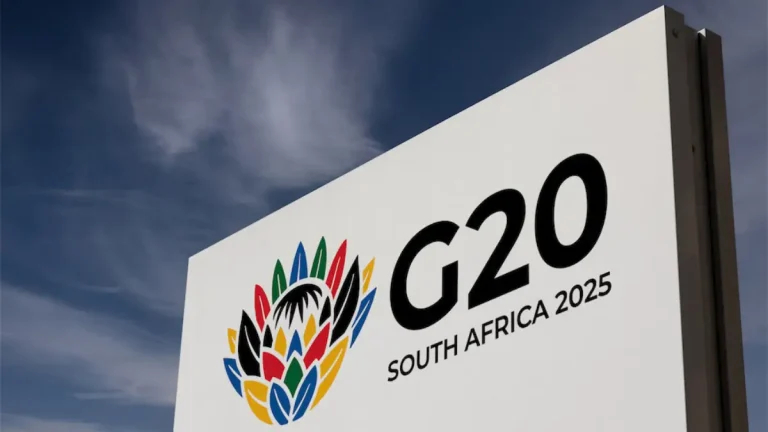Gauteng is ready to welcome the world. As the 2025 G20 Leaders’ Summit kicks off, the province stands prepared to host one of the biggest global events South Africa has ever seen — and to debut a new era in border management.
Thank you for reading this post, don't forget to subscribe!Delegates arriving at OR Tambo International Airport and Cape Town International Airport will be the first to use the new Electronic Travel Authorisation (ETA) system. The launch marks a major milestone in South Africa’s journey toward digital, paperless travel.
ALSO READ: SA Airports Under Review for Bomb Safety Measures Ahead of G20
Smart Borders for a Smart Nation
The ETA replaces outdated visa forms with a faster, online system that uses facial recognition and biometric verification. It simplifies travel while improving security.
Testing began in October, with G20 delegates from Mexico, Indonesia, India, and China among the first users. More than 200 authorisations were processed smoothly before the summit.
Once rolled out to all travellers, the ETA will let visitors apply online, get approval digitally, and pass through checkpoints without queues or paperwork. Everything links to the national Electronic Movement Control System, ensuring faster verification and safer borders.
Tourism and Trade Boost for Gauteng
The ETA rollout supports South Africa’s plan to grow tourism and trade. Tourism already contributes nearly 7% to the national economy. Easier entry means more visitors, more spending, and more jobs.
For Gauteng, this is big. OR Tambo International Airport is Africa’s busiest gateway. The province wants to keep it that way — efficient, modern, and globally connected.
The ETA helps position Gauteng as a tech-savvy hub for business and travel, showing investors and visitors that South Africa is serious about innovation.
Simplifying Borders, Strengthening Africa
Alongside the ETA, Parliament is finalising the One-Stop Border Post Bill. It will allow South Africa and its neighbours to create shared border control zones. Travellers and goods will be processed once, not twice, cutting time and costs.
The change supports the African Continental Free Trade Area (AfCFTA), making it easier for countries to trade and move goods. It’s another sign that South Africa is investing in regional growth, not just national upgrades.
Together, the ETA and One-Stop Border Post form part of a modern system built for speed, safety, and cooperation across Africa.
Gauteng Ready for the G20 Stage
Months of preparation have transformed Gauteng ahead of the summit. Roads, lights, and traffic systems have been fixed. Backup power units and generators are on standby at major sites, including hotels and airports.
Maintenance teams are working around the clock to ensure the province runs smoothly while thousands of visitors arrive. Johannesburg Water and Rand Water have confirmed a stable supply. Traffic routes to Nasrec Expo Centre are ready, and emergency crews are stationed across key points.
Gauteng Premier Panyaza Lesufi confirmed that the province’s readiness model, where departments and municipalities meet weekly, will continue even after the summit. The goal is straightforward: to make collaboration an integral part of everyday service delivery.
South Africa on Display
The G20 Summit is more than meetings and motorcades. It’s a showcase of what South Africa can do.
At the main event, world leaders will discuss economic cooperation. At the G20 Social Summit, youth leaders, women’s groups, and civil society will explore themes of solidarity, equality, and sustainability.
For Gauteng, it’s a chance to show its strength, efficient systems, modern infrastructure, and people who can deliver under pressure. The ETA pilot, the border reforms, and the infrastructure upgrades all highlight a province in motion.
Building a Legacy Beyond the Summit
These changes aren’t just for the cameras. The G20 preparations are part of a long-term plan to make Gauteng more efficient and resilient.
Roads, lighting, and power systems upgraded for the summit will serve communities for years. The coordination model that brought government teams together will stay in place, turning summit meetings into service delivery sessions.
It’s proof that major events can drive real progress when planning focuses on people, not just logistics.
Why It Matters
The G20 puts Gauteng on the global map. It shows that the province can host major events while embracing technology and innovation.
Digital systems like the ETA simplify travel. Stronger infrastructure improves daily life. Together, they show that Gauteng isn’t just keeping up, it’s leading South Africa’s future.
Moving Forward
As delegates land and cameras flash, Gauteng’s message is clear: the province is open, connected, and ready for tomorrow.
Stay informed about the Electronic Travel Authorisation system and border reforms at www.dha.gov.za. For Gauteng residents, this summit isn’t just an event; it’s a symbol of progress, cooperation, and pride.




